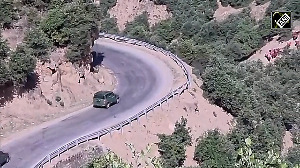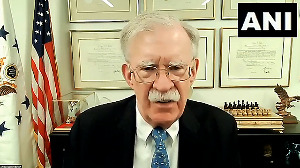Voicing serious concern over the deteriorating situation in the Middle East, following Israeli military offensive in Lebanon, India has asked all parties to act towards preventing its escalation.
Intervening in a debate on the situation in the Middle East, India's UN Ambassador Nirupam Sen sharply criticised the Security Council on Friday, for not taking action despite severe escalation in the conflict, a looming humanitarian crisis and 'distinct' possibility of spillover of the conflict beyond the region.
"The international community needs to call for an immediate halt to hostilities on all sides, counsel utmost restraint, especially in the excessive use of force by Israel and urge return to dialogue," he told the Council members.
Strongly condemning both abduction of Israeli soldiers and 'excessive and disproportionate' military retaliation by the Jewish state, Sen slammed Tel Aviv for targeting civilian infrastructure, including the Beirut airport.
The responsibility to protect women and children in an armed conflict has to be 'real and not theoretical', he said.
There can be no justification for targeting civilians and civilian infrastructure, Sen asserted, adding this merits 'condemnation and is contrary to international law'.
It is India's firm conviction, he said, that lasting peace and security in the region, which is not only in the interest of countries of the region but also the whole world, can be achieved only through a peaceful dialogue and not through the use of force.
Sen said an immediate and comprehensive ceasefire would be predicated on the return of captured Israeli soldiers, extension of the authority of the government of Lebanon all over its territory and immediate measures to provide relief to the people and withdrawal of Israeli forces.
The Lebanese government has been unable to assert authority in the southern part of the country, which is virtually controlled by Hezbollah, which uses the region to fire rockets on Israel.
Sen urged the Council to act quickly to fulfil its charter responsibility of maintaining international peace and security.
His remarks came in the wake of the Council's failure to agree on any plan of action with the US insisting that release of kidnapped Israeli soldiers and end of terror against Israel by Hezbollah are the starting ppints of the peace process.
But several other members believe that what is needed is immediate ceasefire to avoid rising civilian casualties.
As a major contributor to peacekeeping missions in the region including UN Interim Force in Lebanon, Sen said India is concerned about the conditions under which peacekeepers in the conflict zone are required to perform their duties.
He was referring to Annan's report to the Council that UNIFIL has no freedom of movement, which precluded it from providing humanitarian escorts for displaced persons and that it was experiencing difficulties in receiving essential supplies.
"These are a cause for serious concern. Unilateral restrictions on UNIFIL have to be removed and UN's mandate and the sanctity of its personnel have to be respected," Sen said.
Expressing concern over the situation in the Gaza Strip, Sen condemned killing of innocent civilians, including women and children, by the Israeli defence forces.
India, he said, is seriously concerned over the hardships and sufferings of the Palestinian people as a result of the evolving situation in Gaza and the West Bank, a situation that has been exacerbated by Israel's destruction of Palestinian infrastructure, including roads, bridges and power plants.
The Office for the UN Coordination of Humanitarian Affairs, he pointed out, has assessed that nearly half the population in the Gaza Strip is currently without electricity, and that this situation could persist for up to nine months.
This reduced capacity is affecting the provision of water, with daily access for families being cut by up to 50 percent in some parts of the Gaza Strip, he said.
"India condemns the wholly unjustified arrest and continuing incarceration of ministers of the Palestinian National Authority and members of the Palestinian Legislative Council. There can be no justification whatsoever for taking such action against the duly elected representatives of the Palestinian people. We call upon Israel to release them immediately and unconditionally," the Indian Ambassador said.
In keeping with India's tradition and consistent policy of extending support to Palestinian people, he said the government has decided to give humanitarian assistance worth Rs 100 million, primarily in the form of life-saving drugs and medical supplies requested by the Palestinian authorities.
This is in addition to assistance worth about Rs 700 million pledged last year during Palestinian President Mahmud Abbas's visit to India.
Sharat Pradhan in Lucknow adds:
Minister of State for External Affairs E Ahmed termed the Israeli attack on Lebanon as 'highly disproportionate.'
"India has condemned the attack on Lebanon; it was highly disproportionate and deserves to be condemned in the strongest terms," he asserted.
While condemning the arrest of elected representatives of the Hamas in Palestine, he asked, "Can there be any justification for putting elected cabinet ministers behind bars? After all, the whole world had appreciated the election. Now why is Israel meddling with them in this manner?"
Asked to comment on India's refusal to snap diplomatic ties with Israel on the issue, the minister said, "We will continue to have our relations with Israel but we are careful to see that this does not have any negative impact on our relations with Palestine either."
He said, "The Indian government has already worked out a $15 million assistance package for Palestine; besides a consignment of medicines worth Rs 100 million was on its way from New Delhi to Palestine. It is only awaiting clearance of passage through Israel."






